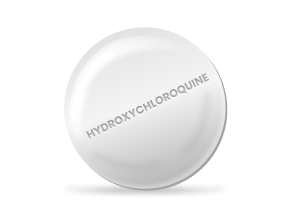
Plaquenil (hydroxychloroquine) is an antimalarial medication used to treat or prevent malaria, a disease caused by parasites, which enter the body through the bite of a mosquito. Plaquenil is also used to treat symptoms of rheumatoid arthritis and discoid or systemic lupus erythematosus. Plaquenil is available in generic form.


| Package | Per pill | Total price | Save | Order |
|---|---|---|---|---|
| 400 x 10 Pills | $7.39 |
$73.90
|
- | Add to cart |
| 400 x 20 Pills | $5.76 |
$115.11
|
$32.60 | Add to cart |
| 400 x 30 Pills | $5.21 |
$156.33
|
$65.40 | Add to cart |
| 400 x 60 Pills | $4.67 |
$279.97
Free Trackable Delivery
|
$163.20 | Add to cart |
| 400 x 90 Pills | $4.48 |
$403.62
Free Trackable Delivery
|
$261.90 | Add to cart |
| 400 x 120 Pills | $4.39 |
$527.26
Free Trackable Delivery
|
$360.00 | Add to cart |
| 400 x 180 Pills | $4.30 |
$774.54
Free Trackable Delivery
|
$556.20 | Add to cart |
| 400 x 270 Pills | $4.24 |
$1,145.48
Free Trackable Delivery
|
$850.50 | Add to cart |
| 400 x 360 Pills | $4.21 |
$1,516.41
Free Trackable Delivery
|
$1,144.80 | Add to cart |
| Package | Per pill | Total price | Save | Order |
|---|---|---|---|---|
| 200 x 10 Pills | $4.36 |
$43.57
|
- | Add to cart |
| 200 x 20 Pills | $3.39 |
$67.88
|
$19.40 | Add to cart |
| 200 x 30 Pills | $3.07 |
$92.18
|
$38.70 | Add to cart |
| 200 x 60 Pills | $2.75 |
$165.08
|
$96.60 | Add to cart |
| 200 x 90 Pills | $2.64 |
$237.99
Free Trackable Delivery
|
$154.80 | Add to cart |
| 200 x 120 Pills | $2.59 |
$310.90
Free Trackable Delivery
|
$212.40 | Add to cart |
| 200 x 180 Pills | $2.54 |
$456.71
Free Trackable Delivery
|
$327.60 | Add to cart |
| 200 x 270 Pills | $2.50 |
$675.41
Free Trackable Delivery
|
$502.20 | Add to cart |
| 200 x 360 Pills | $2.48 |
$894.12
Free Trackable Delivery
|
$676.80 | Add to cart |
Your order will be packed safe and secure and dispatched within 24 hours. This is exactly how your parcel will look like (pictures of a real shipping item). It has a size and a look of a regular private letter (9.4x4.3x0.3 inches or 24x11x0.7cm) and it does not disclose its contents



PLAQUENIL is indicated in adult and pediatric patients for the:
- Treatment of uncomplicated malaria due to Plasmodium falciparum, Plasmodium malariae, Plasmodium vivax, and Plasmodium ovale.
- Prophylaxis of malaria in geographic areas where chloroquine resistance is not reported.
Limitations Of Use
PLAQUENIL is not recommended for:
- Treatment of complicated malaria.
- Treatment of malaria by chloroquine or hydroxychloroquine-resistant strains of Plasmodium species
- Treatment of malaria acquired in geographic areas where chloroquine resistance occurs or when the Plasmodium species has not been identified.
- Prophylaxis of malaria in geographic areas where chloroquine resistance occurs.
- Prevention of relapses of P. vivax or P. ovale because it is not active against the hypnozoite liver stage forms of these parasites. For radical cure of P. vivax and P. ovale infections, concomitant therapy with an 8-aminoquinoline drug is necessary
Rheumatoid Arthritis
PLAQUENIL is indicated for the treatment of acute and chronic rheumatoid arthritis in adults.
Systemic Lupus Erythematosus
PLAQUENIL is indicated for the treatment of systemic lupus erythematosus in adults.
Chronic Discoid Lupus Erythematosus
PLAQUENIL is indicated for the treatment of chronic discoid lupus erythematosus in adults.
Overdosage
The 4-aminoquinoline compounds are very rapidly and completely absorbed after ingestion, and in accidental overdosage, or rarely with lower doses in hypersensitive patients, toxic symptoms may occur within 30 minutes. The symptoms of overdosage may include headache, drowsiness, visual disturbances, cardiovascular collapse, convulsions, hypokalemia, rhythm and conduction disorders including QT prolongation, torsades de pointes, ventricular tachycardia and ventricular fibrillation, followed by sudden potentially fatal respiratory and cardiac arrest. Treatment is symptomatic and must be prompt. Immediate gastric lavage until the stomach is completely emptied is indicated. After lavage, activated charcoal is introduced by the stomach tube within 30 minutes of ingestion of the drug may inhibit further intestinal absorption. To be effective, the dose of activated charcoal should be at least five times the estimated dose of hydroxychloroquine ingested.
Consideration should be given to administering diazepam parenterally since studies suggest that it may be beneficial in reversing chloroquine and hydroxychloroquine cardiotoxicity.
Respiratory support and shock management should be instituted as necessary.
Exchange transfusions are used to reduce the level of 4-aminoquinoline drug in the blood.
A patient who survives the acute phase and is asymptomatic should be closely observed for at least six hours. Fluids may be forced and sufficient ammonium chloride (8 g daily in divided doses for adults) may be administered for a few days to acidify the urine. This will promote urinary excretion in cases of both overdosage and sensitivity. However, caution must be exercised in patients with impaired renal function and/or metabolic acidosis.
Storage
Dispense in a tight, light-resistant container as defined in the USP/NF. Store at room temperature up to 30°C (86°F) and allow for excursions between 15°C and 30°C (59°F and 86°F).
Safety information
Warnings
Cardiomyopathy And Ventricular Arrhythmias
Fatal and life-threatening cases of cardiotoxicity, including cardiomyopathy, have been reported in patients treated with PLAQUENIL. Signs and symptoms of cardiac compromise have occurred during acute and chronic PLAQUENIL treatment. Patients may present with ventricular hypertrophy, pulmonary hypertension and conduction disorders including sick sinus syndrome. ECG findings include atrioventricular, right or left bundle branch block.
PLAQUENIL has a potential to prolong the QT interval. Ventricular arrhythmias (including torsades de pointes) have been reported in PLAQUENIL-treated patients. The magnitude of QT prolongation may increase with increasing concentrations of the drug. Therefore, the recommended dose should not be exceeded. Avoid PLAQUENIL administration in patients with congenital or documented acquired QT prolongation and/or known risk factors for prolongation of the QT interval such as:
- Cardiac disease, e.g., heart failure, myocardial infarction.
- Proarrhythmic conditions, e.g., bradycardia (< 50 bpm).
- History of ventricular dysrhythmias.
- Uncorrected hypokalemia and/or hypomagnesemia.
- Concomitant administration with QT interval prolonging agents as this may lead to an increased risk for ventricular arrhythmias.
Therefore, PLAQUENIL is not recommended in patients taking other drugs that have the potential to prolong the QT interval. Monitor cardiac function as clinically indicated during PLAQUENIL therapy. Correct electrolyte imbalances prior to use. Discontinue PLAQUENIL if cardiotoxicity is suspected.
Retinal Toxicity
Irreversible retinal damage was observed in some patients treated with hydroxychloroquine sulfate and it is related to cumulative dosage and treatment duration. In patients of Asian descent, retinal toxicity may first be noticed outside the macula.
Risk factors for retinal damage include daily hydroxychloroquine sulfate dosages ≥5 mg/kg of actual body weight, durations of use greater than five years, renal impairment, use of concomitant drug products such as tamoxifen citrate, and concurrent macular disease.
Within the first year of starting PLAQUENIL, a baseline ocular examination is recommended including best corrected distance visual acuity (BCVA), an automated threshold visual field (VF) of the central 10 degrees (with retesting if an abnormality is noted), and spectral domain ocular coherence tomography (SD-OCT). For patients at higher risk of retinal damage, monitoring should include annual examinations which include BCVA, VF and SD-OCT. For patients without significant risk factors, annual retinal exams can usually be deferred until five years of treatment. In patients of Asian descent, it is recommended that visual field testing be performed in the central 24 degrees instead of the central 10 degrees.
If ocular toxicity is suspected, discontinue PLAQUENIL and monitor the patient closely given that retinal changes and visual disturbances may progress even after cessation of therapy.
Serious Skin Reactions
Serious adverse reactions have been reported with the use of PLAQUENIL including Stevens-Johnson syndrome (SJS), toxic epidermal necrolysis (TEN), drug reaction with eosinophilia and systemic symptoms (DRESS syndrome), acute generalized exanthematous pustulosis (AGEP). Monitor for serious skin reactions, especially in patients receiving a drug that may also induce dermatitis. Advise patients to seek medical attention promptly if they experience signs and symptoms of serious skin reactions such as blisters on the skin, eyes, lips or in the mouth, itching or burning, with or without fever. Discontinue PLAQUENIL if these severe reactions occur.
Worsening Of Psoriasis And Porphyria
Administration of PLAQUENIL in patients with psoriasis may precipitate a severe flare-up of psoriasis. Administration of PLAQUENIL in patients with porphyria may exacerbate porphyria. Avoid PLAQUENIL in patients with psoriasis or porphyria, unless the benefit to the patient outweighs the possible risk.
Hematologic Toxicity
PLAQUENIL may cause myelosuppression including aplastic anemia, agranulocytosis, leukopenia, or thrombocytopenia. Monitor blood cell counts periodically in patients on prolonged PLAQUENIL therapy. If the patient develops myelosuppression which cannot be attributable to the disease, discontinue the drug.
Hemolytic Anemia Associated With G6PD Deficiency
Hemolysis has been reported in patients with glucose-6-phosphate dehydrogenase (G6PD) deficiency. Monitor for hemolytic anemia as this can occur, particularly in association with other drugs that cause hemolysis.
Skeletal Muscle Myopathy Or Neuropathy
Skeletal muscle myopathy or neuropathy leading to progressive weakness and atrophy of proximal muscle groups, depressed tendon reflexes, and abnormal nerve conduction, have been reported. Muscle and nerve biopsies have demonstrated bodies and muscle fiber atrophy with vacuolar changes. Assess muscle strength and deep tendon reflexes periodically in patients on long-term therapy with PLAQUENIL. If weakness occurs, discontinue the drug.
Neuropsychiatric Reactions Including Suicidality
Suicidal behavior has been reported in patients treated with PLAQUENIL. Alert patients to contact their healthcare provider if they experience new or worsening depression, suicidal thoughts or behavior, or mood changes. The risk and benefit of continued treatment with PLAQUENIL should be assessed for patients who develop these symptoms.
Hypoglycemia
PLAQUENIL can cause severe and potentially life-threatening hypoglycemia, in the presence or absence of antidiabetic agents. Measure blood glucose in patients presenting with clinical symptoms suggestive of hypoglycemia and as adjust the antidiabetic treatment as necessary. Warn PLAQUENIL-treated patients about the risk of hypoglycemia and educate them on the signs and symptoms of hypoglycemia; diabetic patients should monitor their blood sugar levels. Advise patients to seek medical attention if they develop any signs and symptoms of hypoglycemia.
Nonclinical Toxicology
Carcinogenesis, Mutagenesis, Impairment Of Fertility
No carcinogenicity or genotoxicity studies have been conducted with hydroxychloroquine. No animal studies have been performed to evaluate the potential effects of hydroxychloroquine on reproduction or development, or to determine potential effects on fertility in males or females.
Use In Specific Populations
Pregnancy
Pregnancy Exposure Registry
There is a pregnancy exposure registry that monitors pregnancy outcomes in women exposed to PLAQUENIL during pregnancy. Encourage patients to register by contacting 1-877-311-8972.
Risk Summary
Prolonged clinical experience over decades of use and available data from published epidemiologic and clinical studies with PLAQUENIL use in pregnant women have not identified a drug-associated risk of major birth defects, miscarriage, or adverse maternal, or fetal outcomes. There are risks to the mother and fetus associated with untreated or increased disease activity from malaria, rheumatoid arthritis, and systemic lupus erythematosus in pregnancy. Animal reproduction studies were not conducted with hydroxychloroquine.
The estimated background risk of major birth defects and miscarriage for the indicated populations is unknown. All pregnancies have a background risk of birth defect, loss, or other adverse outcomes. In the US general population, the estimated background risk of major birth defects and miscarriage in clinically recognized pregnancies is 2-4% and 15-20%, respectively.
Clinical Considerations
Disease-Associated Maternal And/Or Embryo-Fetal Risk
Malaria: Malaria during pregnancy increases the risk for adverse pregnancy outcomes, including maternal anemia, prematurity, spontaneous abortion, and stillbirth.
Rheumatoid Arthritis: Published data suggest that increased disease activity is associated with the risk of developing adverse pregnancy outcomes in women with rheumatoid arthritis Adverse pregnancy outcomes include preterm delivery (before 37 weeks of gestation), low birth weight (less than 2500 g) infants, and small for gestational age at birth.
Systemic Lupus Erythematosus: Pregnant women with systemic lupus erythematosus, especially those with increased disease activity, are at increased risk of adverse pregnancy outcomes, including spontaneous abortion, fetal death, preeclampsia, preterm birth, and intrauterine growth restriction. Passage of maternal auto-antibodies across the placenta may result in neonatal illness, including neonatal lupus and congenital heart block.
Data
Human Data
Data from published epidemiologic and clinical studies have not established an association with PLAQUENIL use during pregnancy and major birth defects, miscarriage, or adverse maternal or fetal outcomes. Hydroxychloroquine readily crosses the placenta with cord blood levels corresponding to maternal plasma levels. No retinal toxicity, ototoxicity, cardiotoxicity, or growth and developmental abnormalities have been observed in children who were exposed to hydroxychloroquine in utero. Available epidemiologic and clinical studies have methodological limitations including small sample size and study design.
Lactation
Risk Summary
lactation data report that hydroxychloroquine is present in human milk at low levels. No adverse reactions have been reported in breastfed infants. No retinal toxicity, ototoxicity, cardiotoxicity, or growth and developmental abnormalities have been observed in children who were exposed to hydroxychloroquine through breastmilk. There is no information on the effect of hydroxychloroquine on milk production. The developmental and health benefits of breastfeeding should be considered along with the mother’s clinical need for PLAQUENIL and any potential adverse effects on the breastfed child from PLAQUENIL or from the underlying maternal condition.
Pediatric Use
The safety and effectiveness of PLAQUENIL have been established in pediatric patients for the treatment of uncomplicated malaria due to P. falciparum, P. malariae, P. vivax, and P. ovale, as well as for the prophylaxis of malaria in geographic areas where chloroquine resistance is not reported. However, this product cannot be directly administered to pediatric patients weighing less than 31 kg because the film-coated tablets cannot be crushed or divided.
The safety and effectiveness of PLAQUENIL have not been established in pediatric patients for the treatment of rheumatoid arthritis, chronic discoid lupus erythematosus, or systemic lupus erythematosus.
Geriatric Use
Clinical trials of PLAQUENIL did not include sufficient numbers of patients 65 years of age and older to determine whether they respond differently from younger adult patients. Nevertheless, this drug is known to be substantially excreted by the kidney, and the risk of toxic reactions to this drug may be greater in patients with impaired renal function. In general, dose selection in geriatric patients should start with the lowest recommended dose, taking into consideration the greater frequency of decreased hepatic, renal or cardiac function, and of concomitant disease or other drug therapy.
Patients With Renal Or Hepatic Disease
A reduction in the dosage of PLAQUENIL may be necessary in patients with hepatic or renal disease.
Disclaimer
The information on this page is not intended to be a substitute for professional medical advice. Do not use this information to diagnose or treat your problem without consulting your doctor.
Side effects
Common side effects of Plaquenil include
- nausea,
- vomiting,
- stomach pain or cramps,
- loss of appetite,
- weight loss,
- diarrhea,
- dizziness,
- spinning sensation,
- headache,
- ringing in your ears,
- mood changes,
- nervousness,
- irritability,
- skin rash,
- itching, or
- hair loss.
Tell your doctor if you experience serious side effects of Plaquenil including
- muscle weakness,
- twitching,
- uncontrolled movement,
- loss of balance or coordination,
- blurred vision,
- light sensitivity,
- seeing halos around lights,
- pale skin,
- easy bruising or
- bleeding,
- confusion,
- unusual thoughts or behavior, or
- seizures (convulsions).
Cialis Super Active is a generic drug, against erectile dysfunction, containing 20 mg of tadalafil. The tablets in this series have a gel inside. This form allows the active substance, Tadalafil, to immediately enter the blood, thus providing an immediate effect. The result from the Cialis Super Active tablets appears after 5 minutes! The action lasts for two days. The drug is safe and has virtually no contraindications.

Brand Viagra - a drug from Pfizer, with a basic chemical called Sildenafil Citrate, is a first developed pharmaceutical to cure the difficulties with erection. It functions approximately within 4-5 hours, must be taken an hour prior to sex.

Cialis Super Active is a generic drug, against erectile dysfunction, containing 20 mg of tadalafil. The tablets in this series have a gel inside. This form allows the active substance, Tadalafil, to immediately enter the blood, thus providing an immediate effect. The result from the Cialis Super Active tablets appears after 5 minutes! The action lasts for two days. The drug is safe and has virtually no contraindications.

Viagra Professional - Advantage of Professional Viagra from usual Viagra is that it works twice longer (6 - 8 hours) and has a stronger effect. Strengthens desire, improves brightness of sexual feelings and increases duration of sexual intercourse.

Viagra Super Active - an innovative formula of drug for treatment of erectile dysfunction. Drug is produced in gelatin capsules that allows to avoid emergence of heartburn or other unpleasant feelings in a stomach. Sildenafil Super Active also has a number of advantages. It is soaked quicker and works longer. The principle of action is identical with ordinary Sildenafil. Each capsule contains about 100 mg of active ingredient. That is quite enough for any man.

Brand Viagra - a drug from Pfizer, with a basic chemical called Sildenafil Citrate, is a first developed pharmaceutical to cure the difficulties with erection. It functions approximately within 4-5 hours, must be taken an hour prior to sex.




















